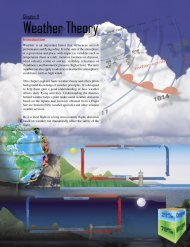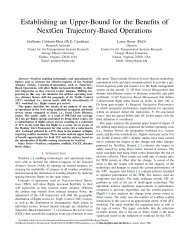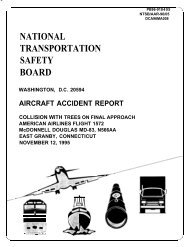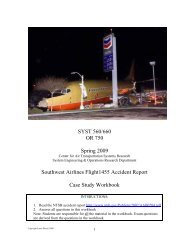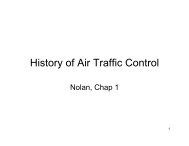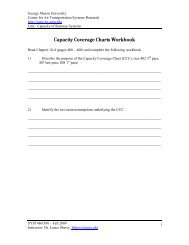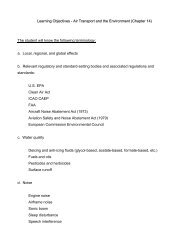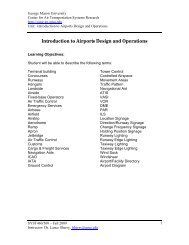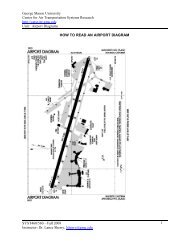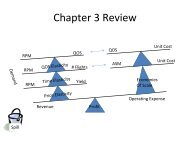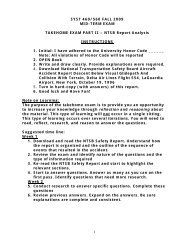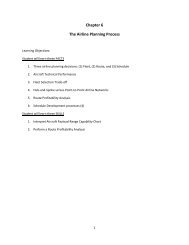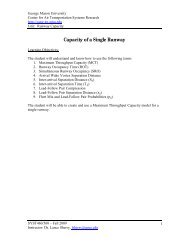Air Traffic Management Concept Baseline Definition - The Boeing ...
Air Traffic Management Concept Baseline Definition - The Boeing ...
Air Traffic Management Concept Baseline Definition - The Boeing ...
Create successful ePaper yourself
Turn your PDF publications into a flip-book with our unique Google optimized e-Paper software.
aviation. it was agreed that ICAO’s existing policies on seeking exemption,<br />
reduction and elimination of taxes on international air transport be continued. [Ref.<br />
4, page 51] (S), (E)<br />
Aero-Political Pressures: ...the multilateral/bilateral traffic rights debate,<br />
especially where ‘fifth freedom’ is concerned...seems most likely to dominate aeropolitical<br />
affairs...it is pointed out that where the U.S. is involved, many countries in<br />
the region (Asia-Pacific) feel they have had an unfair deal ...described as<br />
‘inequitable and antiquated bilaterals’, which has led to ‘damaging disputes’ with<br />
such countries as Australia, Japan and Thailand, disrupting trade and travel.<br />
Singapore feels that its own liberal attitude-‘Singapore’s skies are open to all U.S.<br />
carriers’-is not fully reciprocated by the Americans....it is felt that the U.S. now<br />
enjoys an unacceptable level of ‘fifth-freedom traffic’ which accounts for some<br />
40% of the total air traffic in the Asia-Pacific region. [Ref. 4, page 79-80] (S),<br />
(E)<br />
Issue # 4: FAA Funding Reform<br />
• Although the FAA’s budget grew significantly in the 1980’s, the years of growth in FAA<br />
funding appear unlikely to continue...the FAA’s budget has been cut by $600 million over<br />
the last few years. <strong>The</strong> FAA also has substantially reduced the number of employees and<br />
eliminated many technology programs...funding for FAA is expected to continue to<br />
decline in the foreseeable future because of spending reductions in transportation<br />
programs proposed in the recent balanced budget resolution...because of efforts to balance<br />
the federal budget, future funding will fall far short of what the FAA will need to provide<br />
even the current level of services, and drastic cuts in services will need to be made if new<br />
revenue is not found. <strong>The</strong> administration...projects an aggregate $12 billion shortfall in<br />
FAA funding over the time period from fiscal year 1997 to fiscal year 2002. This projected<br />
shortfall represents the difference between FAA’s stated need of $59 billion during that<br />
period and an estimated budget cap of $47 billion...the year-to-year appropriations process<br />
makes it difficult for the FAA to operate under a long-term capital investment plan. This<br />
leads to reactive, near-term investment decisions by the FAA based on an artificially<br />
imposed federal budget process, rather than on the basis of need or sound business<br />
decisions. [Ref. 7, page 9] (O), (E)<br />
Issue # 5: Environmental Considerations<br />
• ...the impact of world air transport on the environment has been far less severe than<br />
other modes of transportation in energy consumption, emissions, global warming, land<br />
use, and noise. However, tougher standards are being proposed. IATA has argued...that<br />
such new requirements would affect the development of new aircraft, which are currently<br />
in their earliest conceptual stages, already appear to offer the prospect of substantial<br />
environmental benefits in terms of fuel and emissions efficiency, but if tougher new<br />
153



